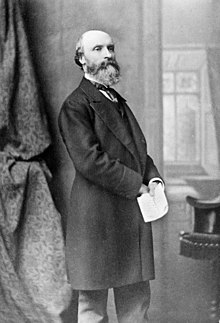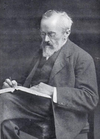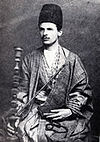From Wikipedia, the free encyclopedia
The Fitzpatrick Lecture is given annually at the Royal College of Physicians on a subject related to history of medicine .[ 1] [ 2] Thomas Fitzpatrick .[ 3] [ 4] [ 5] Sir Norman Moore , who persuaded her to choose ‘’history of medicine’’ as a subject. Subsequently, Moore was credited with its idea and implementation.[ 6]
The first two Fitzpatrick lectures were given by Joseph Frank Payne,[ 6] Royal Society of Medicine and with whose support Sir William Osler established the History of Medicine Section .[ 7] [ 8]
Lecturers
1903-1920
Years
Name
Lecture title
Comments
Image
1903-1904
Joseph Frank Payne The Medicine of Anglo-Saxon Times .[ 9] Paid tribute to Thomas Fitzpatrick prior to first lecture, stating that Norman Moore, an intimate friend of Fitzpatrick, should have given the first lecture.[ 6]
1905-1906
Sir Norman Moore The history of the study of medicine in the British Isles .[ 10] Moore spoke on Medical Study in London during the Middle Ages and Education of physicians in London in the 17th century .[ 10]
1907-1908
Leonard Guthrie
Contributions to the Study of Precocity in Children .[ 11] The History of Neurology .
After Guthrie's death, his work was privately printed in 1921, by his nephew, Eric G. Millar.[ 12]
1909-1910
Clifford Allbutt Greek Medicine in Rome .[ 13] [ 14] Allbutt dedicated the published lectures to Sir Norman Moore, president of the RCP.[ 14]
1911-1912
Raymond Crawfurd *The King's Evil .[ 8]
Crawfurd further expanded these topics to produce books on the subjects.[ 15]
1913-1914
Charles Arthur Mercier *Astrology in Medicine .[ 16] Leper houses and mediaeval hospitals .[ 17]
1915-1916
William Halse Rivers Medicine, Magic and Religion .[ 18]
1917-1918
Arnold Chaplin Medicine in England during the reign of George III .[ 19]
1919-1920
Edward Granville Browne Arabian medicine .[ 20]
1921-1940
1941-1960
Years
Name
Lecture title
Comments
1948-1949
W.H Wynn
The Pestilences of War .[ 1]
1950-1952
W. Brockbank
The History of Some Therapeutic Procedures .[ 1]
1952-1953
M. Davidson
Medicine in Oxford, a Historical Romance .[ 1]
1954-1955
C. E. Newman The Evolution of Medical Education in the Nineteenth Century .[ 1] Newman described the development of professional solidarity and societies of physicians and apothecaries, demonstrating similarities between apothecaries and attorneys.[ 28]
1956-1957
C F T East
Some Aspects of the History of Cardiology .[ 1]
1958-1959
W. S. C. Copeman Medical Practice in the Tudor Period .[ 1]
1960-1961
K D Keele Evolution of Clinical Methods in Medicine .[ 1] Published in a book reviewed by Lloyd G. Stevenson.[ 29]
1961-1980
Years
Name
Lecture title
Comments
1960-1961
K. D. Keele
Evolution of Clinical Methods in Medicine [ 1]
1962-1963
A H T Robb-Smith
The Oxford Medical School and its Graduates .[ 1]
1964-1965
R R Trail
The History of Popular Medicine in England: up to the 17th century .[ 1]
1966
Geoffrey Keynes John Woodall, Surgeon, 1556-1643. His place in medical history .[ 1]
1967
P E Thompson Hancock.[ 1]
1968
C. E. Newman The History of the College Library .[ 1]
1969-1970
Major General A. N. T. Mences
The Influence of War on Medicine The Influence of Medicine on War .[ 1]
1971-1972
Edgar Ashworth Underwood
The Evolution of Haematology: The History of the Formed Elements of the Blood .The Evolution of Haematology: The History of some Diseases of the Blood .[ 1]
1973
Major General R. J. G. Morrison
Dr Messenger Monsey, 1693-1788 .[ 1]
1975
W. C. Gibson
A Canadian Trio of Internalists – Banting , Bethune and Chisholm .[ 1]
1976
Gweneth Whitteridge
Some Italian Precursors of the London College of Physicians .[ 1]
1977
E. S. Clarke
The Neutral Circulation:the role of analogy in medicine .[ 1]
1979
C. C. Boothe
Clinical Science in the age of Reason .[ 1]
1980
A. J. Robertson Dinner with Laennec .[ 1] A. J. Robertson was the second medical editor of journal Thorax . His Fitzpatrick lecture was based on Läennec, and the physicians who contributed to the confusion about rales and rhonchi.[ 30]
1981-2000
Years
Name
Lecture title
Comments
1981
P A J Ball
Plants, their Predators and the Physician .[ 1]
1982
A Hollman
Thomas Lewis - Physiologist, Cardiologist and Clinical Scientist .[ 1]
1983
R. M. Kark
Richard Bright
1984
Gordon Wolstenholme Governments may damage your health .[ 31]
1986
John Malins
Provincial physicians in England 1700-1900
1987
Alex Sakula A history of asthma .[ 32]
1988
A. Goldberg
Towards European medicine: an historical perspective .[ 33]
1989
P. Richards
Leprosy : myth, melodrama and mediaevalism[ 34]
1993
A S Mason
Hans Sloane and his friends[ 35]
1994
J H Baron
Art in hospitals .[ 36] Given whilst Baron was a RCP councillor.[ 37]
1995
D A Pyke
The great insanity: Hitler and the destruction of German science .[ 38]
1996
Tattersall R
Frederick Pavy (1829-1911)-the last of the physician chemists[ 39]
2001 onwards
Years
Name
Lecture title
Comments
2015
T Peters
King George III and the porphyria myth - causes, consequences and re-evaluation of his mental illness with computer diagnostics .[ 40]
2016
David Eedy
Churchill's medical men.[ 41]
2017
Professor Gareth Williams
Edward Jenner and John Hunter : the apprentice and his sorcerer[ 42]
2018
Nick Levell
Daniel Turner Vs Thomas Dover - a story of rivals, slaves and pirates, dermatology and physicians[ 3]
References
^ a b c d e f g h i j k l m n o p q r s t u v w x Briggs, Asa (2005). A History of the Royal College of Physicians of London ISBN 978-0-19-925334-0 ^ "Fitzpatrick and Monckton Copeman Lecture 2017 – The Worshipful Society of Apothecaries" . www.apothecaries.org .^ a b "FitzPatrick Lecture 2018" . RCP London . 22 January 2018. Retrieved 23 June 2018 .^ Norrie, Philip (2016). A History of Disease in Ancient Times: More Lethal than War ISBN 978-3-319-28936-6 ^ "Fitzpatrick Trust" (PDF) . Royal College of Physicians. Archived from the original on 4 January 2015. Retrieved 23 June 2018 .{{cite web }}: CS1 maint: bot: original URL status unknown (link )^ a b c Payne, Joseph Frank (27 June 1903). "The FITZPATRICK LECTURES on the HISTORY of MEDICINE: Delivered in the Royal College of Physicians" . Br Med J . 1 (2217): 1477–1480. doi :10.1136/bmj.1.2217.1477 . ISSN 0007-1447 . PMC 2513942 PMID 20760991 . ^ Hunting, Penelope (2002). The History of The Royal Society of Medicine . Royal Society of Medicine Press. pp. 330–333. ISBN 978-1853154973 ^ a b c Dodds, Charles; Payne, L.M. (1963). "Sir Raymond Crawfurd" . Proceedings of the Royal Society of Medicine . 56 (Suppl 1): 19–24. doi :10.1177/00359157630560S106 . ISSN 0035-9157 . PMC 1896754 PMID 14044492 . ^ Mann, R.D. (2012). Modern Drug use: An Enquiry on Historical Principles ISBN 978-94-010-8962-3 ^ a b Moore, Norman; London School of Hygiene and Tropical Medicine (1908). The history of the study of medicine in the British Isles : The Fitzpatrick lectures for 1905-6 delivered before the Royal College of Physicians of London / Norman Moore ^ Guthrie, Leonard George (1921). Contributions to the Study of Precocity in Children: The Fitzpatrick Lectures on the History of Medicine Delivered at the Royal College of Physicians in the Years 1907, 1908 ^ Shuttleworth, Sally (2010). The Mind of the Child: Child Development in Literature, Science, and Medicine 1840-1900 ISBN 978-0-19-968217-1 ^ "Greek Medicine in Rome. The Fitzpatrick Lectures on the History of Medicine, Delivered at the Royal College of Physicians of London in 1909-1910, with other Historical Essays". JAMA: The Journal of the American Medical Association . 77 (11): 882. 10 September 1921. doi :10.1001/jama.1921.02630370056034 . hdl :2027/hvd.32044011283355 ISSN 0098-7484 . ^ a b Allbutt, T. Clifford (Thomas Clifford) (1921). Greek medicine in Rome : the Fitzpatrick Lectures on the history of medicine delivered at the Royal College of Physicians of London in 1909-1910, with other historical essays ^ Rolleston, J.D. (2004). Crawfurd, Sir Raymond Henry Payne- Oxford dictionary of national biography : in association with the British Academy : from the earliest times to the year 2000 . Matthew, H. C. G. (Henry Colin Gray), Harrison, Brian, 1937-, British Academy. Oxford: Oxford University Press. pp. 92–93. ISBN 978-0198614111 OCLC 54778415 . ^ Mercier, Charles Arthur (1914). Astrology in medicine : the Fitzpatrick lectures delivered before the Royal College of Physicians on November 6 and 11, 1913 : with addendum on saints and signs ^ Mercier, Charles Arthur (1915). Leper houses and mediaeval hospitals: being the FitzPatrick lectures, delivered before the Royal College of Physicians, London, 5th and 10th November, 1914 ^ PERRY, W. J. (October 1924). "Medicine, Magic and Religion: the FitzPatrick Lectures delivered before the Royal College of Physicians of London 1915 and 1916". Nature . 114 (2868): 563–564. Bibcode :1924Natur.114..563P . doi :10.1038/114563a0 . ISSN 0028-0836 . S2CID 45654602 . ^ Chaplin, Arnold (1919). Medicine in England during the reign of George III. The Fitzpatrick lectures delivered at the Royal College of Physicians 1917-1918; ^ Browne, Edward Granville; Fitz-Patrick lectures, (1919 (1921). Arabian medicine : being the Fitzpatrick lectures delivered at the College of Physicians in November 1919 and November 1920 ^ "R. O. Moon, D.M., F.R.C.P." British Medical Journal 2 (4831): 343–344. 8 August 1953. doi :10.1136/bmj.2.4831.342-b . S2CID 220138025 .^ Mitchell, Peter (2007). The Purple Island and Anatomy in Early Seventeenth-century Literature, Philosophy, and Theology ISBN 978-0-8386-4018-0 ^ G H Brown (1936), "Arthur Shadwell" , The Lancet , doi :10.1016/S0140-6736(00)57058-5 ^ Spencer, H. R. (12 November 1927). "The FitzPatrick Lectures on the History of British Midwifery (1650-1800)" . British Medical Journal . 2 (3488): 853–856. doi :10.1136/bmj.2.3488.853 . ISSN 0007-1447 . PMC 2525138 PMID 20773500 . ^ "Munks Roll Details for John Davy Rolleston" . munksroll.rcplondon.ac.uk . Retrieved 10 July 2018 .^ Rolleston, J. D. (John Davy) (1937). The history of the acute exanthemata : the Fitzpatrick lectures for 1935 & 1936 ^ "A History of Tropical Medicine Based on the Fitzpatrick Lectures Delivered Before the Royal College of Physicians of London 1937-38". Journal of the American Medical Association . 114 (16): 1585. 20 April 1940. doi :10.1001/jama.1940.02810160087038 . hdl :2027/wu.89043229947 ISSN 0002-9955 . S2CID 30188713 . ^ Robson, Robert (1959). The Attorney in Eighteenth-Century England ISBN 978-1-107-65499-0 ^ STEVENSON, LLOYD G. (1966). "Book Reviews". Journal of the History of Medicine and Allied Sciences . XXI (4): 421–422. doi :10.1093/jhmas/XXI.4.421 . ISSN 0022-5045 . ^ Seaton, A. (2006). "Dr a John Robertson (1919–2006): An appreciation" . Thorax . 61 (12): 1021–1022. doi :10.1136/thx.2006.072546 . PMC 2117055 ^ Wolstenholme, G. (January 1985). "Governments may damage your health. The FitzPatrick Lecture 1984" . Journal of the Royal College of Physicians of London . 19 (1): 17–22. ISSN 0035-8819 . PMC 5370982 PMID 3882955 . ^ Sakula, A. (January 1988). "A history of asthma. The FitzPatrick lecture 1987" . Journal of the Royal College of Physicians of London . 22 (1): 36–44. ISSN 0035-8819 . PMC 5379292 PMID 3276885 . ^ Goldberg, A. (October 1989). "Towards European medicine: an historical perspective. The FitzPatrick lecture 1988" . Journal of the Royal College of Physicians of London . 23 (4): 277–286. ISSN 0035-8819 . PMC 5387602 PMID 2685270 . ^ Richards, P. (January 1990). "Leprosy: myth, melodrama and mediaevalism. The FitzPatrick lecture 1989" . Journal of the Royal College of Physicians of London . 24 (1): 55–62. ISSN 0035-8819 . PMC 5387456 PMID 2407839 . ^ Mason, A. S. (October 1993). "Hans Sloane and his friends. The FitzPatrick Lecture 1993" . Journal of the Royal College of Physicians of London . 27 (4): 450–455. ISSN 0035-8819 . PMC 5396686 PMID 8289170 . ^ Baron, J. H. (March 1995). "Art in hospitals. The Fitzpatrick Lecture 1994" . Journal of the Royal College of Physicians of London . 29 (2): 131–144. ISSN 0035-8819 . PMC 5401301 PMID 7595886 . ^ Bennett, John R. (31 December 2014). "Hugh Baron obituary" . the Guardian . Retrieved 3 July 2018 . ^ Pyke, D. A. (May 1995). "The great insanity: Hitler and the destruction of German science. The FitzPatrick Lecture 1995" . Journal of the Royal College of Physicians of London . 29 (3): 199–206. ISSN 0035-8819 . PMC 5401197 PMID 7658416 . ^ Tattersall, R. (May 1996). "Frederick Pavy (1829-1911)--the last of the physician chemists. The FitzPatrick Lecture 1996" . Journal of the Royal College of Physicians of London . 30 (3): 238–245. ISSN 0035-8819 . PMC 5401441 PMID 8811599 . ^ Peters, Timothy (April 2015). "FitzPatrick Lecture: King George III and the porphyria myth - causes, consequences and re-evaluation of his mental illness with computer diagnostics" . Clinical Medicine . 15 (2): 168–172. doi :10.7861/clinmedicine.15-2-168 . ISSN 1470-2118 . PMC 4953737 PMID 25824070 . ^ "FitzPatrick lecture - Churchill's medical men, Dr David Eedy" . RCP London . 2 December 2015. Retrieved 29 June 2018 .^ "FitzPatrick lecture - Edward Jenner and John Hunter: the apprentice and his sorcerer" . RCP London . 8 February 2017. Retrieved 23 June 2018 .







